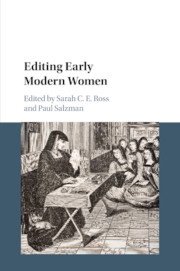Book contents
- Editing Early Modern Women
- Editing Early Modern Women
- Copyright page
- Contents
- Figures
- Contributors
- Book part
- Glossary
- Chapter 1 Introduction
- Part I Editorial Ideologies
- Part II Editing Female Forms
- Chapter 6 Critical Categories
- Chapter 7 Editing Early Modern Women's Letters for Print Publication
- Chapter 8 Editing Queen Elizabeth I
- Chapter 9 Editing Early Modern Women's Dramatic Writing for Performance
- Chapter 10 Single-Author Manuscripts, Poems (1664), and the Editing of Katherine Philips
- Part III Out of the Archives, into the Classroom
- Part IV Editorial Possibilities
- Select Bibliography
- Index
Chapter 10 - Single-Author Manuscripts, Poems (1664), and the Editing of Katherine Philips
from Part II - Editing Female Forms
Published online by Cambridge University Press: 05 August 2016
- Editing Early Modern Women
- Editing Early Modern Women
- Copyright page
- Contents
- Figures
- Contributors
- Book part
- Glossary
- Chapter 1 Introduction
- Part I Editorial Ideologies
- Part II Editing Female Forms
- Chapter 6 Critical Categories
- Chapter 7 Editing Early Modern Women's Letters for Print Publication
- Chapter 8 Editing Queen Elizabeth I
- Chapter 9 Editing Early Modern Women's Dramatic Writing for Performance
- Chapter 10 Single-Author Manuscripts, Poems (1664), and the Editing of Katherine Philips
- Part III Out of the Archives, into the Classroom
- Part IV Editorial Possibilities
- Select Bibliography
- Index
Summary
- Type
- Chapter
- Information
- Editing Early Modern Women , pp. 176 - 194Publisher: Cambridge University PressPrint publication year: 2016
- 4
- Cited by



